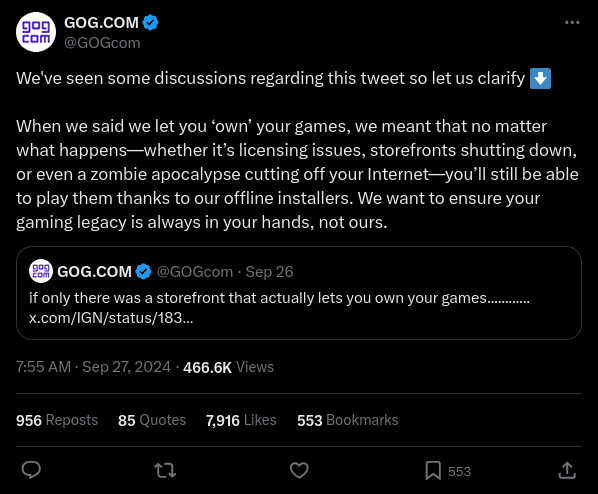this post was submitted on 28 Sep 2024
738 points (98.9% liked)
Games
19110 readers
111 users here now
Video game news oriented community. No NanoUFO is not a bot :)
Posts.
- News oriented content (general reviews, previews or retrospectives allowed).
- Broad discussion posts (preferably not only about a specific game).
- No humor/memes etc..
- No affiliate links
- No advertising.
- No clickbait, editorialized, sensational titles. State the game in question in the title. No all caps.
- No self promotion.
- No duplicate posts, newer post will be deleted unless there is more discussion in one of the posts.
- No politics.
Comments.
- No personal attacks.
- Obey instance rules.
- No low effort comments(one or two words, emoji etc..)
- Please use spoiler tags for spoilers.
My goal is just to have a community where people can go and see what new game news is out for the day and comment on it.
Other communities:
founded 2 years ago
MODERATORS
you are viewing a single comment's thread
view the rest of the comments
view the rest of the comments

I know that. That still misses the point. The point of the law is to clarify that on digital storefronts that you make purchases for licensed digital goods, that you can't imply to the consumer that they actually own those goods. It doesn't matter if there is an offline installer. It doesn't matter if you can 'keep your installers forever'.
This article seems to say that it covers only digital items that have an always online requirement.
https://www.gamefile.news/p/california-ab2426-crew-call-of-duty
So i think offline games don't need the warning, but online games, steaming movies, etc do need the warning.
Edit:
I looked a bit further and found the bill text:
https://leginfo.legislature.ca.gov/faces/billTextClient.xhtml?bill_id=202320240AB2426#99INT
This exception clearly allows for user downloadable installer for a game with offline functionality. But consoles, steam, etc where you don't get a standalone installer, they look like they will need the warning on all titles.
Technically that also applies to Steam, since you get a digital good available at the moment of purchase for permanent offline download to an external storage, just copy the game folder and you're done. It would be the equivalent of a music store place downloading mp3s (and the equivalent to GoG would be selling an .iso to the music CD you can burn whenever you want or an installer that extracts the mp3 to a folder).
If the game itself has DRM then that would also apply to GoG (yes, there are games with DRM on GoG, there's just proportionally less of them).
I had a think about this scenario and I think that if Steam was going to present this argument they would need to document and support this workflow. At the moment the fact that it sometimes works is more of an accident than anything (essentially it's all just files on a disc and sometimes the files still work if you move them somewhere else).
But if they document that you can transfer the install data to another location, and identify which titles that applies to? Then I can see a reasonable argument that they qualify.
How does an offline installer from GOG differ from the offline installer provided on a CD/DVD?
The license for the DVD version is with the actual disk, the license for the offline installer is with the GOG account.
GOG has essentially created a way to bypass their own licenses, as a feature. And it looks like they won't be affected by this law because of it.
They haven't created anything.
They just don't allow games that use DRM (any kind of license check as a prerequisite to run software) on their store. Packaging a game with DRM is an extra step.
DRM and licensing are separate things.
In the legal sense that having DRM-free software does not mean that you're legally entitled to use it, sure.
But checking for a license before running is literally the entire definition of what DRM is. They aren't "bypassing" anything. They didn't create technology. They simply refused to allow software that has any type of license check (DRM).
Never said they created a technology. Sorry you didnt like my choice of words.
They didn't create anything of any type. They just declined games that didn't follow their rules.